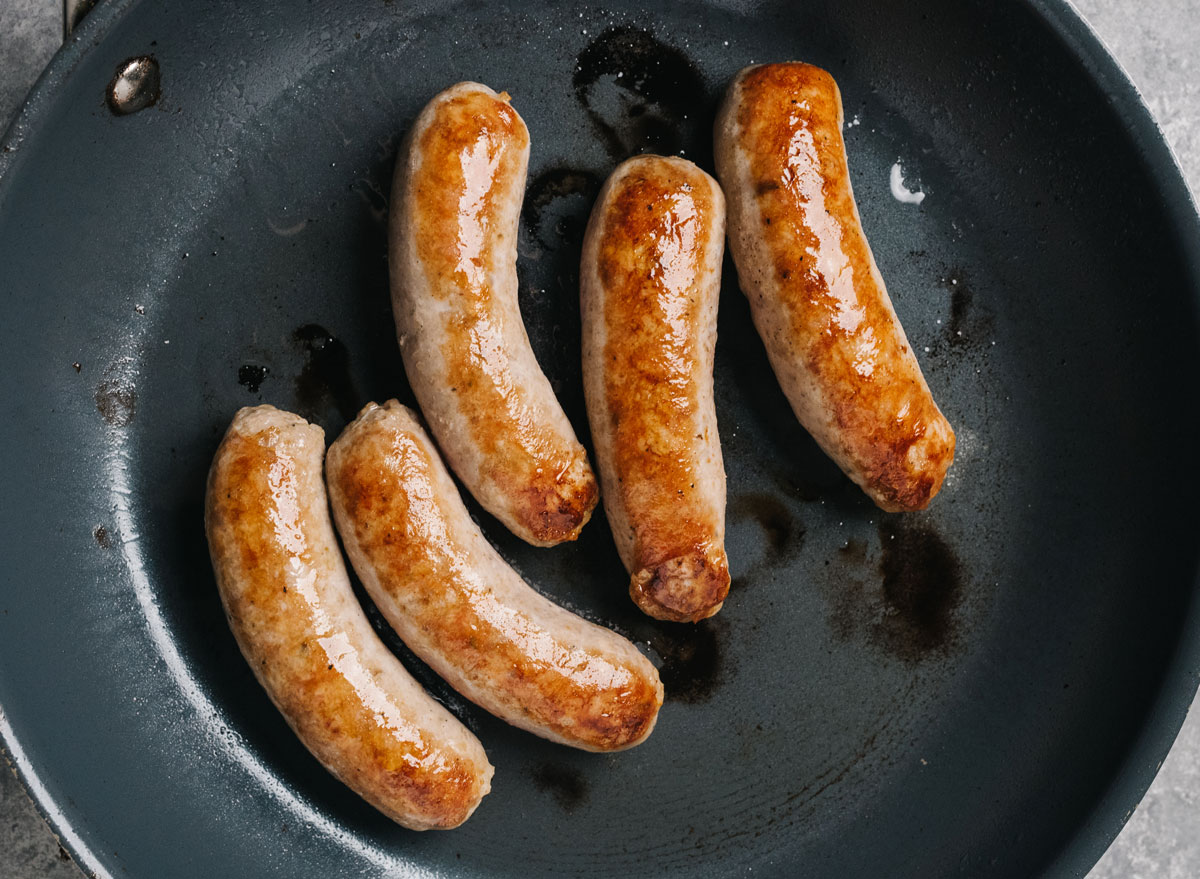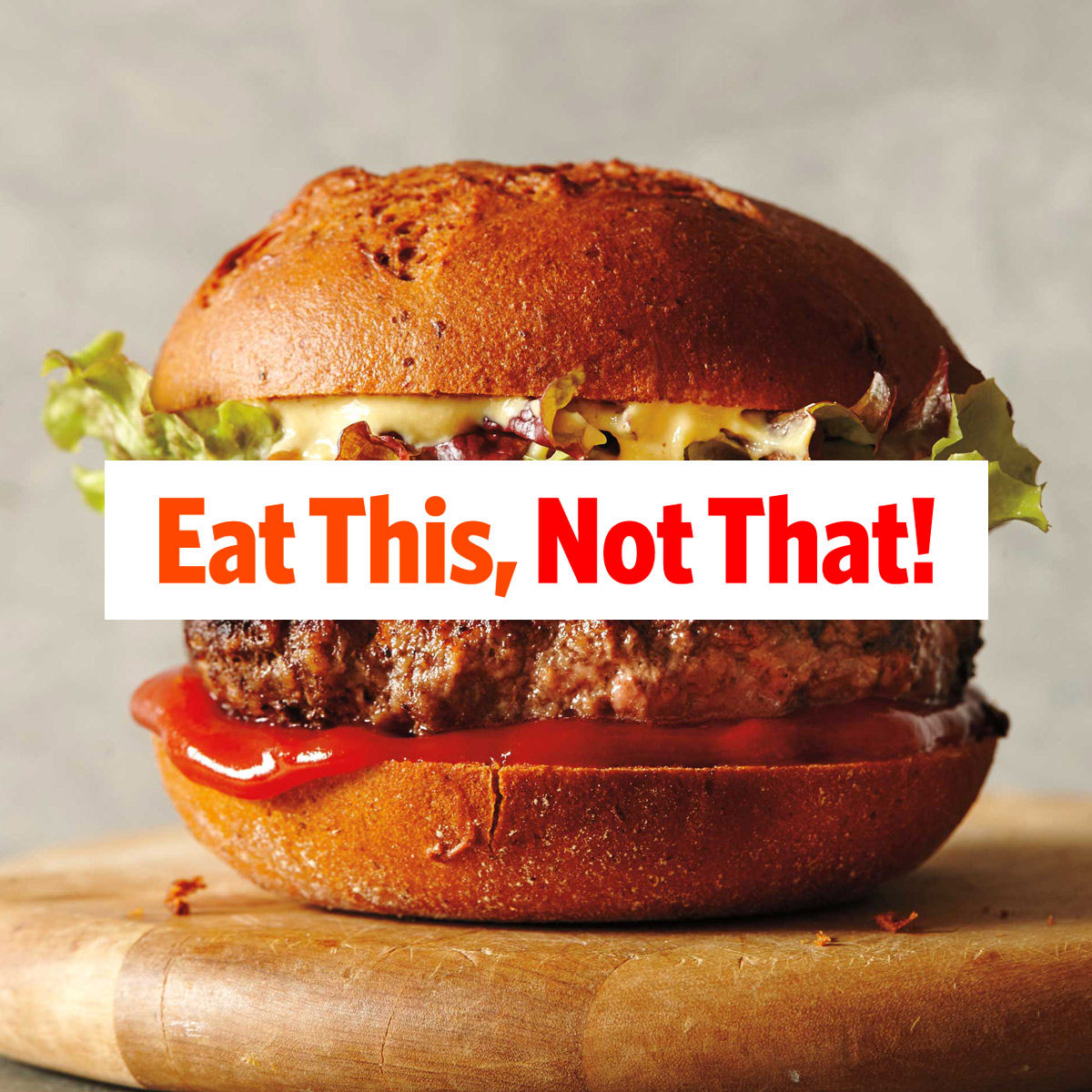The product recommendations in this post are recommendations by the writer and/or expert(s)
interviewed and do not contain affiliate links. Meaning: If you use these links to buy
something, we will not earn a commission.
Sausage isn’t exactly known as a health food. With its sizable sodium content, serious saturated fat, and high levels of processing, you probably won’t see links and patties at the top of anyone’s list of good-for-you meats. In fact, some research has correlated eating more processed and red meats like sausage with an increased risk of colon cancer and heart disease—a good reason to keep your intake moderate.
Still, aren’t there times when you just have a hankering for some salty sausage? At a breakfast buffet or holiday cookout, this savory meat hits the spot. But when you do decide to take the pork plunge, it’s important to avoid sausage brands with low-quality ingredients. Just like hot dogs are often called “mystery meats,” sausages can also be made with funky fillers, preservatives, and additives.
Here’s how to spot low-quality sausage, plus eight examples of the wurst—er, worst—offenders. And if you’d like better options, check out 8 Sausage Brands With the Highest Quality Ingredients.
What Makes a Low-Quality Sausage?
When choosing sausage, watch out for these red flags of low quality:
- Additives and preservatives. Added ingredients like nitrates, nitrites, phosphates, and modified food starch take sausage further from nature and closer to ultra-processed territory.
- High sodium. Sodium is necessary for giving sausage its flavor, but some brands really load their products up with salt. Anything with 20% or more of your daily value of sodium is high.
- Added sugars. Sweetened sausages like maple links may be tasty, but they tend to have high amounts of added sugars. Look out for corn syrup and maltodextrin.
- A long ingredient list. The longer the ingredient list, the more processed the sausage.
- Mechanically separated meats. Mechanically separated meat is derived from the meat left on animal carcasses once the main cuts have been removed. It’s safe to eat, but it may not be the highest-quality meat.
The 8 Sausage Brands with the Lowest Quality Ingredients
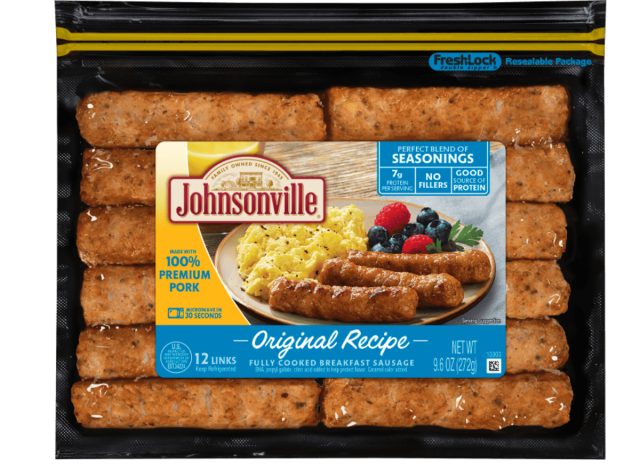

Per serving: 170 calories, 15 g fat (5 g saturated fat), 380 mg sodium, 1 g carbs (0 g fiber, 1 g sugar), 6 g protein
“Don’t let the label on the front of Johnsonville Fully Cooked Breakfast Sausage Original Recipe packages fool you,” says Kristi Ruth, RDN, CNSC, LDN, of Carrots & Cookies.
“Just because a food is labeled with claims like ‘no artificial colors or flavors’ and ‘no fillers,’ it does not mean it is made with high-quality ingredients.” This popular sausage contains corn syrup and artificial preservatives like BHA, which may have carcinogenic effects. Long story short: consider steering clear for your health.
RELATED: 13 Best & Worst Sausage Brands, According to Dietitians
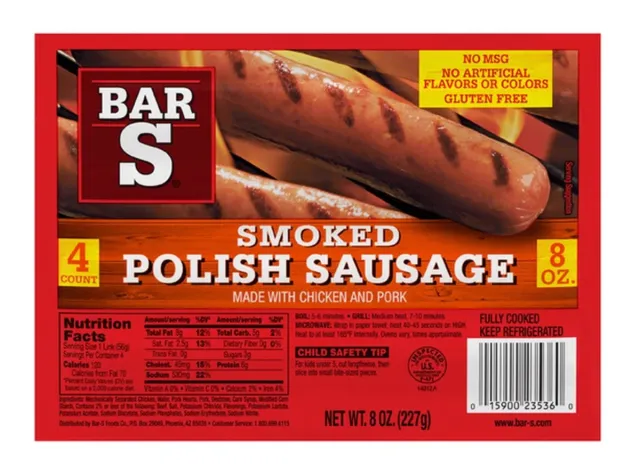

Per serving: 120 calories, 8 g fat (2.5 g saturated fat), 530 mg sodium, 5 g carbs (0 g fiber, 3 g sugar), 6 g protein
Bar S’s first ingredients—mechanically separated chicken and pork hearts—aren’t exactly appealing, and things get worse from there. Sweeteners like dextrose and corn syrup give these links 3 grams of sugar each, while numerous additives round out their ingredient list.
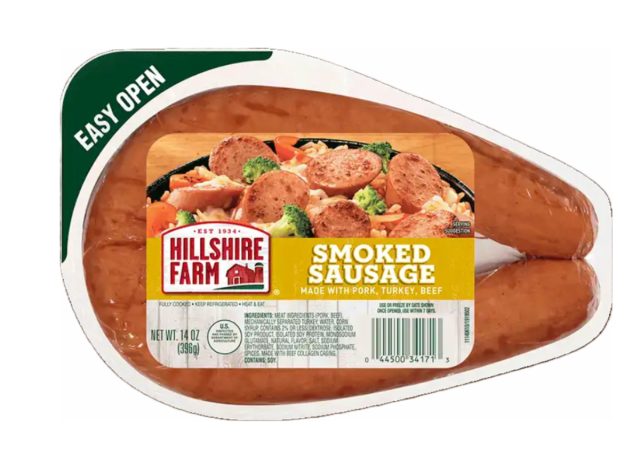

Per serving: 170 calories, 15 g fat (5 g saturated fat), 530 mg sodium, 3 g carbs (0 g fiber, 2 g sugar), 7 g protein
Its name sounds so wholesome, conjuring images of a quaint little farm atop a hill, but Hillshire Farm Smoked Sausage’s ultra-processing is a far cry from what you’d get from a family farm. “This sausage includes ingredients like mechanically separated turkey, which can be a concern due to its high processing and potential loss of nutritional values,” says Jessie Hulsey, RD, LD, of Health Down South.
READ RELATED: Popular Grocery Chain Lidl Just Abruptly Closed 11 Stores
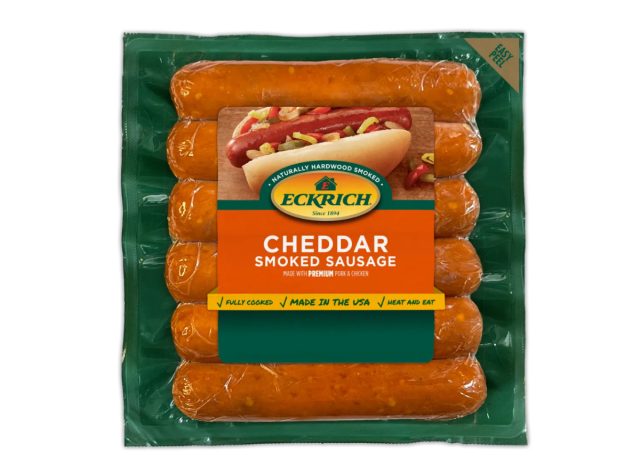

Per serving: 220 calories, 18 g fat (6 g saturated fat), 609 mg sodium, 6 g carbs (0 g fiber, 0 g sugar), 7 g protein
If you’re looking for a higher-quality smoked sausage to grill, take a pass on Eckrich’s. “Eckrich Smoked Sausage is one of the least healthy choices due to its high sodium and added ingredients,” says Amanda Lane, MS, RD, CDCES, of Healthful Lane Nutrition. “One link has 27% of your daily recommended sodium. These sausages also contain multiple additives, including phosphates.” Some research shows that consuming high amounts of phosphates can increase the risk of vascular damage.
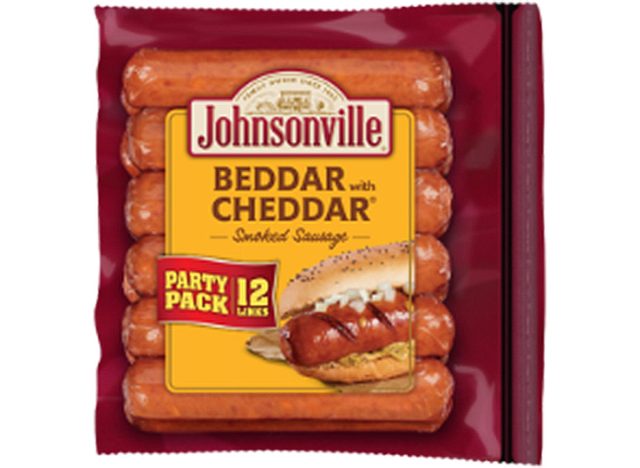

Per serving: 200 calories, 17 g fat (6 g saturated fat), 620 mg sodium, 2 g carbs (0 g fiber, 1 g sugar), 8 g protein
Cheese has plenty of health benefits, but the processed cheddar (aka American cheese) in Johnsonville’s Beddar with Cheddar Sausage isn’t the wholesome dairy you want more of in your diet. Besides being highly processed, these sausages come with a hefty saturated fat count of 6 grams per serving, about 30% of your recommended daily intake. “Consuming excessive amounts of saturated fats can lead to elevated cholesterol levels and an increased risk of heart disease,” says Hulsey.
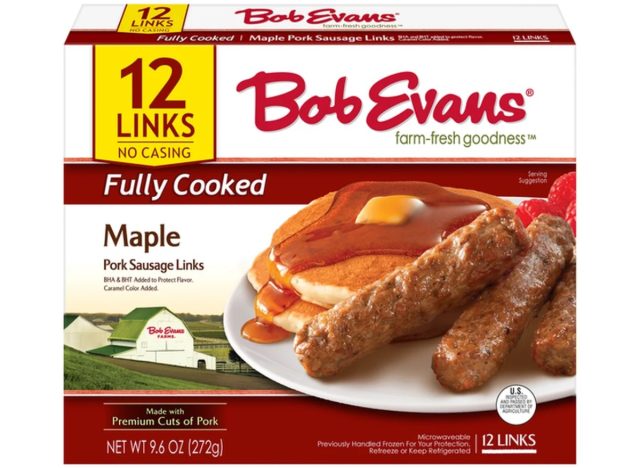

Per serving: 220 calories, 20 g fat (8 g saturated fat), 470 mg sodium, 0 g carbs (0 g fiber, 0 g sugar), 9 g protein
Convenient though it may be to heat up fully cooked sausage links in the microwave, their health factor doesn’t always match their ease of cooking. With a lengthy ingredient list—including added artificial flavors—Bob Evans Fully Cooked Maple Pork Sausage Links aren’t such a sweet deal for your health.
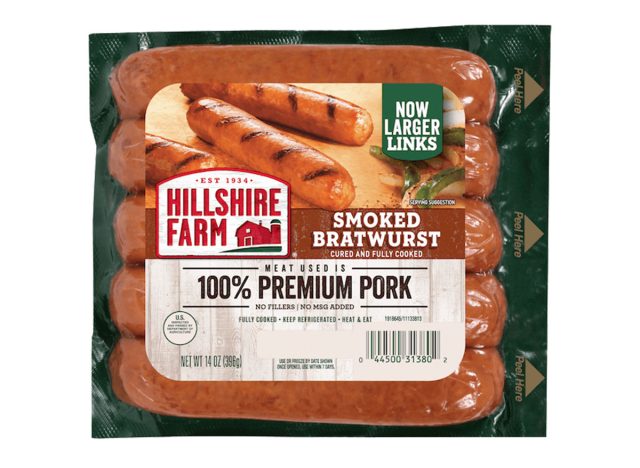

Per serving: 200 calories, 18 g fat (6 g saturated fat), 720 mg sodium, 2 g carbs (0 g fiber, 0 g sugar), 9 g protein
Grilling brats? Try getting links fresh from your butcher, rather than Hillshire Farm Smoked Bratwurst. “These low-quality Bratwurst sausages are loaded with several poor quality ingredients, including corn syrup, corn maltodextrin, dextrose, potassium sorbate, and sodium nitrite,” says Ruth. They contain 6 grams of saturated fat and over 700 milligrams of sodium per link, which is half of the maximum amount of both saturated fat and sodium recommended for most adults in one day.”
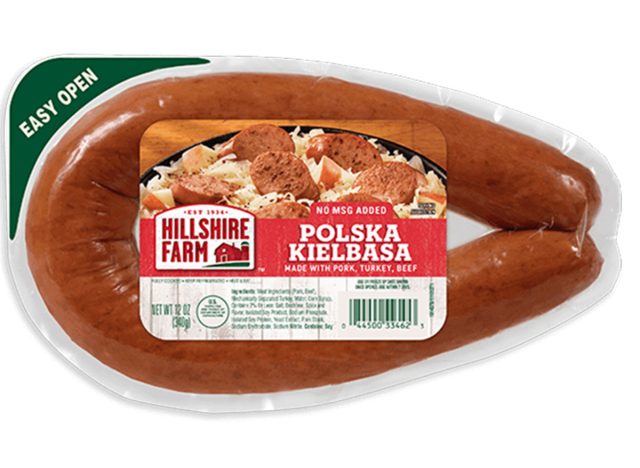

Per serving: 180 calories, 15 g fat (5 g saturated fat), 520 mg sodium, 3 g carbs (0 g fiber, 2 g sugar), 7 g protein
“This is a low-quality sausage choice due to the presence of certain ingredients such as nitrites and nitrates, sodium, saturated fat, and fillers and preservatives,” says registered dietitian Wan Na Chun, MPH, RD, CPT, of One Pot Wellness. Nitrates and nitrites occur naturally in many foods, but when they’re artificially added as preservatives, they can pose problems for health. “Nitrites and nitrates are often added during meat processing as a preservative, where they can be converted into cancer-causing compounds in the body.”

